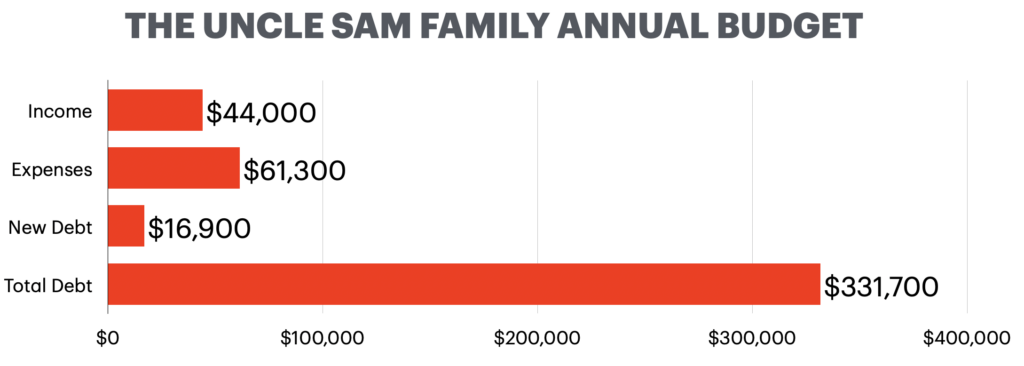The real-life impacts of our national debt and inflation will force more Americans to make some difficult choices
Many reverse mortgage professionals have seen homeowners who’ve made numerous poor financial decisions: racking up high balances on their credit cards, spending more than they earn, and not setting aside money for the future.
But there’s another spendthrift whose unchecked spending and accumulation of debt impacts us all. His name is Uncle Sam.
In his column, A Reverse Mortgage on the Country David Thomas simplifies the scope of the federal government’s debt making it more tangible. To simplify matters he deducted eight digits from the nation’s expenditures and income creating a fictitious family unit.
Here are the key numbers from the U.S. government’s 2023 Federal budget:
- U.S. Income: $4,440,000,000,000
- Federal Budget: $6,130,000,000,000
- New debt: $1,700,000,000,000
- Aggregate National Debt: $33,170,000,000,000
Uncle Sam’s Family Budget:
Dropping eight digits we can see that Uncle Sam’s family brings in approximately $44,000 each year, has $61,300 in annual expenses, has incurred $16,900 in new debt, and now owes a total of $331,700 to date. However, unlike your neighbor Uncle Sam (AKA the U.S. government) can do one thing to manage his increasing debt- create inflation.

How inflation is used to reduce the national debt
Because our national debt is based on the U.S. dollar reducing the value of the dollar reduces the value of the debt. This transfers the burden of our national debt from the creditor (the Federal government) to the borrower (every current and future U.S. resident). Consequently, every American today is shouldering part of the national debt as inflation erodes their purchasing power and reduces their standard of living.
“Essentially, what we have is a reverse mortgage on the country, a practice where we draw upon future resources to meet present demands”, writes David Thomas.
Older homeowners suffering under the burden of inflation may consider a reverse mortgage drawing from the accumulated value of their homes to offset the hidden tax of inflation that was forced upon them.
In conclusion, our national debt is more than just a number- it’s a game-changer that impacts everyone, especially retried Americans living on a relatively fixed income. With the U.S. debt continuing to climb some hard choices will have to be made as inflation continues to rob us of our purchasing power.
By Shannon Hicks